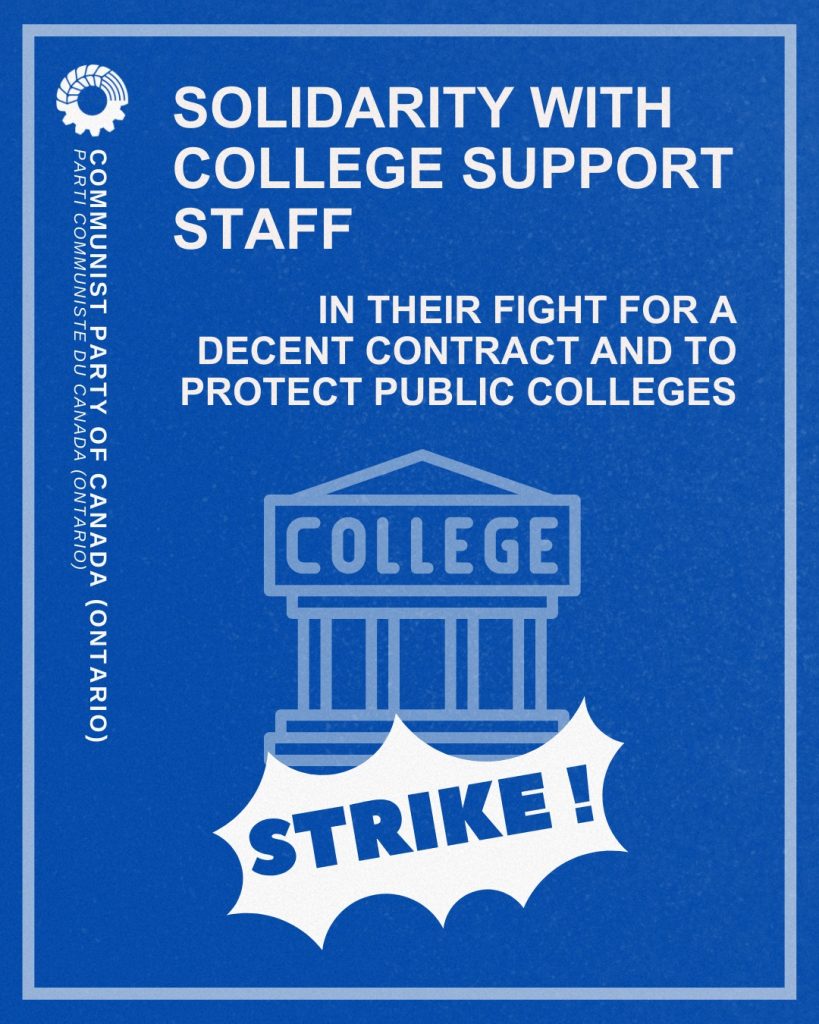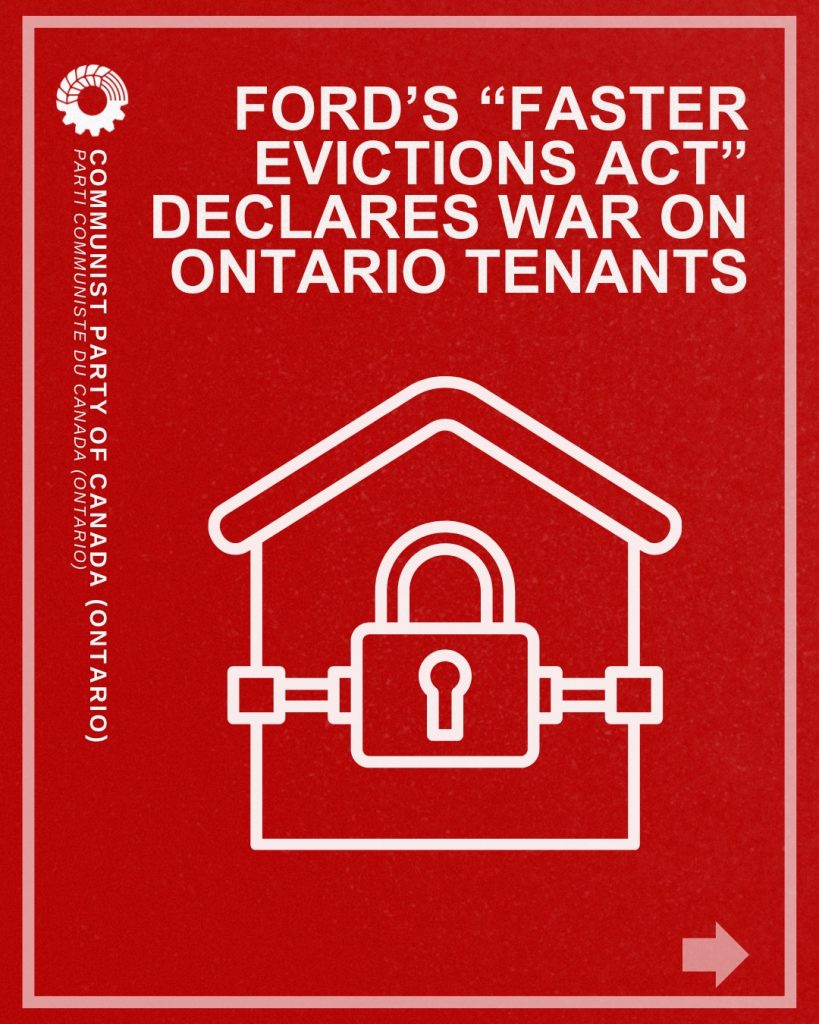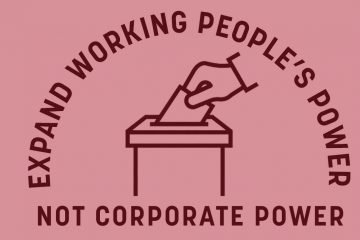After one of the longest summer breaks in recent history, the Ford government has returned to Queen’s Park with a plan for another short, intense session designed to limit debate, avoid public scrutiny, and ram through more of its sweeping corporate agenda. This is their new, undemocratic playbook: govern while the legislature isn’t in session, then unleash a blitz of omnibus legislation to overwhelm resistance. It is a conscious method for accelerating the transfer of public wealth into private hands while minimizing democratic accountability.
The context of this offensive is a deepening economic crisis, the worst impacts of which are being deliberately offloaded onto young workers and the unemployed. Recent analysis from the Canadian Centre for Policy Alternatives reveals a youth employment emergency of generational proportions. Youth unemployment has hit a nine-year high, with unemployment rates of 13.2% for those aged 20-24 and 8.7% for those 25-29. This represents a catastrophic waste of potential, leading to cascading crises in mental health, delayed financial independence, and dismal career prospects.
Premier Ford’s response to this emergency has been to blame the victims, revealing the profound class contempt that underpins his government’s policies. His assertion that young people simply need to look “hard enough” for jobs, even suggesting fast food work, was made as Ontario led the country in job losses, shedding 66,000 positions since the Trump tariffs took hold. This callousness is the voice of a government that serves capital, not working people.
Ford’s concurrent focus on performative, populist stunts such as banning speed cameras or dictating paper bag use at the LCBO, is a core part of the playbook: use peripheral issues to generate headlines and fabricate a “common man” image, providing a smokescreen for the systematic dismantling of public services and the looting of the treasury by corporate friends, especially in the development and retail sectors.
This looting is not metaphorical: it is a structured and deliberate system. The recent Auditor General’s report exposing the $2.5-billion Skills Development Fund scandal is a case study. The report found Labour Minister David Piccini’s office bypassed professional bureaucrats to directly funnel public money to private, for-profit training applicants who scored low on the program’s own metrics. Similar to the Greenbelt scandal, this is the Ford patronage system in action: defund public institutions like colleges to the point of collapse, then divert massive sums to private, unaccountable corporate partners. This deliberate strategy precipitated the recent, intense five-week strike by 10,000 college support staff. While that strike is now over, the underlying funding crisis, a 30% drop in per-student funding since 2013-14, leading to 10,000 layoffs and 600 program suspensions, remains unaddressed. The government’s goal is the deliberate bankruptcy of the public system to make way for privatized, for-profit alternatives.
Nowhere is the failure of the corporate welfare model more stark than in the auto sector, where the government’s entire strategy is unravelling. The decisions by Stellantis to abandon Brampton and General Motors to terminate its BrightDrop line in Ingersoll represent a catastrophic betrayal, sacrificing thousands of jobs and exposing billions in public subsidies as a sham. Auto monopolies, including Volkswagen and Honda, have been gifted over $28 billion in public funds with no binding job guarantees, no public equity, and no industrial plan. This is the outcome of decades of “free trade” deals like the USMCA that empower corporations to pit workers against each other across borders. Ford’s theatrical rage outside closing factories at rallies and press conferences is a hollow performance. His government’s policy of writing blank cheques to foreign monopolies is a direct cause of this vulnerability.
The Communist Party of Canada demands an end to this era of begging transnational corporations for jobs as our industrial base crumbles. We must nationalize the auto industry to create a publicly owned and democratically controlled sector that can produce the electric vehicles necessary for a just, green transition from fossil fuels – these vehicles include public transit and transportation, light industrial vehicles, and passenger vehicles. This must be paired with plant closure legislation that forces companies to justify closure or relocation of facilities, with penalties including full repayment of subsidies and public takeover of the plant. It must also be combined with an expansion of Employment Insurance to 90% of previous earnings for the full duration of unemployment, for all unemployed workers.
The government is now compounding its attacks with a new assault on democratic rights through proposed changes to electoral law. These changes, which include eliminating fixed election dates, raising the individual donation limit to $5,000, and making the per-vote subsidy permanent, are a brazen attempt to consolidate power for the Conservatives and their big-business backers. By increasing the influence of wealthy donors and state funding for establishment parties while doing nothing to address unequal media access or lower spending limits, these reforms are designed to marginalize working-class political expression and solidify a political system that serves corporate interests.
The government is continuing its crusade against public education, with Bill 33, the Supporting Children and Students Act, now being pushed through this fall. This legislation is a reactionary blueprint for an attack on local democracy in order to underfund and privatize. The June seizure of four democratically elected school boards was just the beginning. Education Minister Paul Calandra has now signaled his intent to remove trustees from some school boards. The passage of Bill 33 would grant the Minister even greater power to interfere with local democracy. Clearly the ultimate goal is to eliminate elected trustees entirely. The “back to basics” rhetoric provides a dog-whistle cover for this takeover. This is the neoliberal playbook in its most brazen form: first, impose $6.3 billion in inflation-adjusted cuts to create a crisis of “fiscal mismanagement”; second, use the manufactured crisis as a pretext to seize control; third, privatize assets and impose a regressive agenda.
We must fight to stop this bill. Bill 33 executes this coup on multiple fronts in both public and post-secondary education. It forcibly reinstates failed School Resource Officer (SRO) programs in secondary schools, a move that will resurrect the school-to-prison pipeline and subject racialized students to heightened surveillance and discrimination. Simultaneously, in post-secondary education, it resurrects the core of the defeated “Student Choice Initiative,” imposing ministerial control over ancillary fees in a “right-to-work” style attack aimed at bankrupting student unions, campus newspapers, and vital services like food banks and sexual violence centres. As the Canadian Federation of Students (Ontario) has condemned, this is a direct assault on democratic student decision-making, designed to shatter the organizational capacity of the student movement.
This fall, the government is deploying the same omnibus strategy with Bill 60, the so-called Fighting Delays, Building Faster Act. While public outcry and tenant organizing forced the government to retract its most egregious proposal—a backdoor to end rent control via fixed-term leases—the bill remains a full-scale assault on tenants and democratic municipal planning. Its provisions are a direct attack on working-class Ontarians: it drastically shortens the time tenants have to respond to or appeal eviction notices, makes it harder to withhold rent over maintenance issues, and reduces compensation for those evicted for a landlord’s “personal use.” It empowers the government to override local zoning to favour certain developments while simultaneously banning municipalities from creating dedicated bus lanes or cycling lanes on many streets. This move jeopardizes both rapid transit expansion and the viability of affordable, family-friendly mid-rise housing, proving that the government’s agenda is not about solving the housing crisis but about guaranteeing developer profits. This contrasts sharply with the Communist Party’s demands, which include building hundreds of thousands of units of social housing to build public housing stock and enacting universal rent control including coverage on vacant units and rent roll-backs across Ontario.
Bill 60 is only the latest in a series of aggressive omnibus bills rammed through by this government. The legislative vehicle for this multi-front assault is the omnibus bill, a key tool in the government’s undemocratic playbook. Bills like the Protect Ontario by Unleashing Our Economy Act (Bill 5) bundle radically destructive, unrelated measures, such as creating “Special Economic Zones” exempt from environmental and Indigenous consultation laws, into single, massive pieces of legislation. This deliberate complexity and overload is a strategy to stifle debate, exhaust opposition, and evade scrutiny. It is complemented by the ongoing centralization of power through the expansion of ‘strong mayor’ powers to 169 municipalities, allowing mayors to veto bylaws and pass legislation with only one-third council support, effectively silencing local dissent and transforming municipal governments into provincial satellites.
Ford’s government continues to exacerbate gender inequality, both through direct attacks and through persistent inaction. This summer, the government again refused to declare intimate partner violence (IPV) an epidemic. This, despite overwhelming evidence and a coroner’s inquest recommendation, is a political choice that undermines the urgent, coordinated response needed to address a crisis where a woman is killed by her partner every 48 hours in Canada. The fight against sexual violence has also suffered serious setbacks, as evidenced by the recent Hockey Canada trial. The not-guilty verdict, reached after the survivor faced days of gruelling cross-examination rooted in misogynist myths about consent and promiscuity, exposes a legal system that continues to re-traumatize survivors and fail to deliver justice.
Gender equality is also being held back by the government’s sabotage of the $10-a-day childcare program. The Auditor General has exposed a nearly $2-billion funding shortfall that threatens the program’s future, while enrolment for low-income families has plummeted by 31%. By creating uncertainty and failing to adequately fund and expand a universal public system, the government is pushing childcare costs back onto families, disproportionately burdening women, and blocking their full participation in the workplace. This contrasts sharply with the Communist Party’s demand for a universal, high-quality, and truly accessible public childcare system, free of charge, with 24/7 availability and living wages for childcare workers. This dual assault, which jeopardizes both immediate physical safety and long-term economic security, demonstrates a contempt for gender equality that is consistent with Ford’s broader agenda of cuts and privatization.
Similarly, many of Ford’s policies and statements represent attacks on Indigenous rights. In addition to his efforts to “bulldoze” mining development in the Northern Ontario Ring of Fire region by carving out “special economic zones” and through selective “consultation” with First Nations, the premier stated publicly that First Nations “keep coming hat in hand all the time to the government” for more money.” The Conservatives have also failed to properly recognize September 30 as the National Day for Truth and Reconciliation, they have avoided fully funding and supporting the Indigenous-led search of all former residential school sites in Ontario, and they have neglected to address ongoing systemic injustices in Indigenous communities including long-term boil water advisories.
The rightward tack of the federal Liberal Party under Mark Carney, with its deep austerity and militarism, has given the Ford government more political space to turn to the right. This regressive shift at the federal level, exemplified by bills like C-5 that fast-track projects and override environmental and Indigenous rights, creates a political environment that enables and encourages the Ford government’s own attacks on labour and democratic rights, as seen in the parallel “special economic zones” of Bill 5.
The convergence of crises and aggressive anti-democratic tactics marks an escalation in the Ford government’s agenda. The assault on Indigenous sovereignty in the Ring of Fire, the criminalization of poverty through anti-homeless rhetoric and legislation, complacency in the face of the betrayal of auto workers, ignoring the youth jobs emergency, the attack on tenants’ rights with Bill 60, the systemic attack on women’s safety and economic security, and the all-sided attack on democracy in education are interconnected components of a single strategy: to transfer public wealth and political power to monopolies.
While Ford postures as standing up to Donald Trump on tariffs, his playbook mirrors Trump’s core strategy: using a populist facade to whip up support while systematically attacking democratic institutions and rights on behalf of big business. The working class and its allies must recognize this undemocratic playbook for what it is and respond with determined, extra-parliamentary resistance. We must build powerful, coordinated movements starting with those that unite those immediately under attack by the Ford government: workers, Indigenous nations, students, tenants, educators and many more.
The fightback
The working class and its allies cannot afford to rely on opposition parties that have repeatedly failed to present a credible alternative. The fightback must be built now through coordinated, escalating action in workplaces and on the streets. The political strength of the Ford government, demonstrated by its re-election, has created a mood of despair in some sections of the movement. This despair breeds opportunism, which can be seen in sections of the labour movement pursuing transactional deals with the Conservatives, undermining the class-wide solidarity needed to win. The ruling class is actively working to divide Labour’s resistance, as starkly demonstrated by LiUNA’s recent departure from the Ontario Federation of Labour. This split, triggered by the OFL’s defence of public colleges and its criticism of Ford’s corrupt Skills Development Fund, is a direct result of the government’s strategy of using public funds to buy transactional loyalty from sections of the labour movement. This “divide and conquer” tactic, which saw over $60 million funneled to LiUNA and other construction unions before the election, creates a dangerous precedent where class solidarity is sacrificed for sectoral payoffs.
Canada’s largest private sector union remains outside the house of labour. In the face of the auto industry’s collapse, the fact that Unifor is outside of the CLC and OFL is underscored and weakens solidarity.
This division makes the upcoming OFL convention in November a critical battle of ideas for the direction of the labour movement. The path forward is not to ostracize unions that have taken the bait, but to relentlessly pursue unity on the basis of a common independent working-class political program for labour, rooted in class struggle unionism. The left caucus within the labour movement is advancing a series of vital resolutions that chart this course. Proposals to campaign for a Worker’s Bill of Rights and to develop a unified strike support strategy are essential to defend against the growing attacks on free collective bargaining from all levels of government.
Critically, the fight for economic sovereignty must be central. The call for labour’s support for the nationalization of auto and steel is not a radical abstraction but a necessary response to U.S. attacks on Ontario’s industrial base and corporate betrayal. The collapse of the auto sector demands that labour champion public ownership as the only way to save jobs and facilitate a just transition. This struggle is inseparable from the fight for peace and social justice. Similarly, it has never been so obvious that the struggle against militarism is directly connected to the struggle for decent jobs and social programs. Labour in Ontario must take up the fight as federal cuts trickle down into the Ontario public sector and beyond. The left of labour must re-emphasize the internationalist character of the working class and patiently, but consistently and openly, build solidarity with Palestine within labour. It is time for labour to declare trade with Israel “hot cargo” in solidarity with Palestine.
There are recent broad mobilizations that can be built on by labour-community coalitions. This fall, the “Draw the Line” protests across Canada, including in Toronto and Ottawa, demonstrated the growing unity between movements for peace, climate justice, migrant rights, and against austerity. These mobilizations correctly draw the link between the federal government’s planned massive increase in military spending and the concurrent cuts to social programs, healthcare, and education. This coalition-building is a vital example of how to connect the fight for peace abroad with the fight for prosperity at home.
The OFL’s central task is to fuse the growing rank-and-file militancy into a coherent, united, political force. It must adopt an escalating action plan that transforms isolated strikes into a coordinated political offensive against Ford’s agenda. The seeds of resistance are sprouting; they must grow into a movement capable of defending Ontario’s workers and seizing a future that puts people before profit.
Ontario Provincial Committee, Communist Party of Canada





